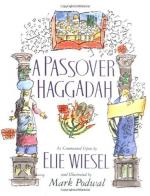|
This section contains 469 words (approx. 2 pages at 300 words per page) |

|
To a great many of his readers, Elie Wiesel is much more than just a writer. He is a symbol, a banner, and a beacon, perhaps the survivor of the Holocaust. More than outliving Auschwitz and Buchenwald, Wiesel, starting with a slim, terrifying volume called Night in 1958, has written about that experience and its aftershock with an anguished power that no living writer has matched. Reading his books—there have been more than a dozen—one feels the inexpressible nausea and revulsion that a simple recitation of statistics never manages to arouse. He seems to own the horror of the death camps, or rather, the horror owns him.
Yet even a writer as single-minded as Wiesel must eventually branch out, and this he has done. In 1972, he published Souls on Fire, a masterful, joyous retelling of the legends surrounding the Hasidic masters of Eastern Europe, and now comes...
|
This section contains 469 words (approx. 2 pages at 300 words per page) |

|


